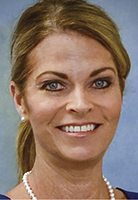
President's Corner
Fit to Lead
BY KRISTI WILSON/
School Administrator, March 2021
 LEADING SCHOOL DISTRICTS
LEADING SCHOOL DISTRICTS through the pandemic has revealed to us much about how vulnerable our students and staff are to physical, social-emotional and mental health demands. What have we learned about ourselves and our vulnerabilities as leaders? What are some self-care actions we could adopt to protect our health and enhance our leadership capabilities?
We often think that our leadership requires us to sacrifice at the expense of our own needs but this is counterintuitive. If we don’t pay attention to our own health and wellness, we are sacrificing our ability to be the best leaders we can be.
It’s important to realize that our physical health affects our brain and our cognitive abilities. Study after study reveals that our diet, exercise and sleep profile directly influences our mental alertness and clarity of thought. Research shows that poor health accelerates our cognitive decline as we age.
The American Heart Association recently reported on the influence of diet on brain health in a news story “The Best Foods for Brain Health,” which was posted Dec. 9, 2020, on the association’s website. Dr. Lisa Mosconi, director of the Women’s Brain Initiative, says, “Of all the organs in our body, the brain is the one most easily damaged by a poor diet. From its very architecture to its ability to perform, every aspect of the brain calls for proper food.”
The heart association also reported in its December issue of
Hypertension, the results of a study that concluded that high blood pressure (a health factor persistently associated with the stress of the superintendent position) accelerates memory loss and other cognitive declines for middle-aged or older adults.
Stress can change the brain in ways that affect cognition, attention and memory. It drives mood and anxiety while ultimately affecting heart health adversely. The Harvard Medical School offers six tips for protecting ourselves from damaging stress: establish control and routine of your life, get a good night’s sleep, get organized, get help from the medical community if you need it and change your attitude toward stress in recognizing that a certain degree of stress is helpful for growth.
In a typical day as superintendent, we may finish a lengthy meeting on the 3rd-grade reading programs and then jump right into our next meeting with building architects who are planning a new school. From there, we may go off to a public speaking event in our community followed by a meeting with the school board president. This doesn’t take into account our continuous attention to the safety and welfare of every student and staff member.
Leaders in school districts of every size must have the stamina to be effective in all of these types of engagements, day after day, routinely clocking in 50- and 60-hour work weeks.
We all are too hard on ourselves. Carrying guilt and a sense of failure about our own health and wellness routines is easy to do, but it is wrong. Rather than view our own condition as a secondary factor in meeting the demands of the job, we must think about self-care as an essential aspect of our leadership.
We all strive to do our best in everything we do. Now is the time to start improving our personal health, to care for ourselves so we can care for others.
Find out what works for you, whether it is putting a treadmill in your office or improving one simple thing about your diet. Start building some time into your weekly calendar to address your own health needs.
Making that self-care appointment a regular feature of your schedule will become a transformational act that will grow your capacity as a leader.
KRISTI WILSON is AASA president in 2020-21. Twitter:
@KwilsonBESD33